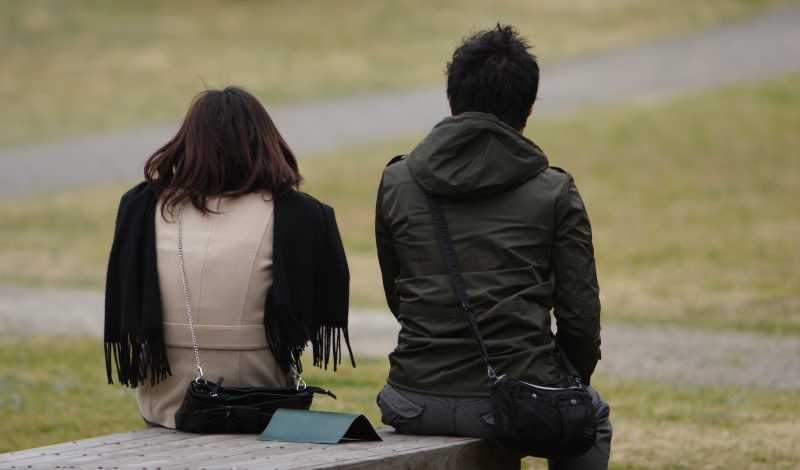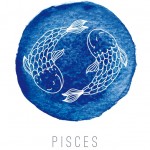1. Two people meet.
2. They fall in love.
3. They live happily ever after.
OR
They break up and part ways.
OR
They break up… and then, make up… and then, break up… and then…
Ever been in the last one? The endless cycle of an on and off relationships?
Ouch.
Image source: Google, copyright-free image under Creative Commons License
Suggested read: Why letting go of a relationship isn’t as simple as it seems
Then you know how on and off relationships are fraught with an endless pattern of confusion over falling in and out of love due to continual conflicts between partners!
This usually occurs owing to a conflict and the inability to sever the relationship due to the longevity of the attachment. Either way, there is a dangerously heightened delusion in believing that there is a ‘happily ever after’ at the end of the path when there have been a series of dissolutions and renewals already, and the frustration over ‘it’s over’ is mixed with a codependent longing for the ‘I am sorry. Let’s talk’ call you know is coming!
But is this convoluted, conflicted, and confusing journey of an on-again off-again relationship worth the routine rides of the roller coaster of intimacy, hurt, loss, and REPEAT? Let’s take a look.
The definition
An on-again off-again relationship is a personal equation between two individuals who commit to their bond, sever the relationship, and then recommit to it. This cycle is repeated again and again, thereby, forming an unhealthy and toxic pattern of relationship dissolution and renewals. Repeated ending and renewing of a relationship is often called relationship cycling (Dailey, Pfister, Jin, Beck, & Clark, 2009), and this dynamic can threaten the health and well-being of the relationship and the partners.
What it entails?
Image source: Google, copyright-free image under Creative Commons License
Not an uncommon problem, the complicated trajectory of an on-again off-again relationship involves an unstable dynamic. No relationship is divorced from its due share of conflicts but the reason on-again off-again relationships find themselves in the on-again off-again boat is their own doing. The partners in on and off relationships find it easier to abort the conflict by calling it quits and then, skirting the relationship issues altogether when they get back together. This merely involves postponing the confrontation with their relationship problems to a hypothetical ‘never’ by dissolving their bond but which pops up for its merited resolution as soon as they renew their relationship. And when that eventuality presents itself, both partners find it easier to dart toward the off-switch than deal with the on-mode of the issues that cause disagreement.
Suggested read: Breakup or makeup – when to let go?
And the reason the disagreement causes the sprint toward the exit, only to take a U-turn and return to the point before the disagreement flared, is because the partners haven’t learnt to ‘agree to disagree’ without being disagreeable. This endless pattern, then, causes the wires to be crossed each time a conflict happens and the possibility of a short circuit due to an inflated misuse of the on-off dynamic.
Why does it happen?
On-again off-again relationships, as already explained, owe their origin to an inability to deal with conflict. This conflict, in turn, may owe its existence to a number of factors. Personal characteristics of partners, an unhealthy/toxic pattern of fighting, general relationship dissatisfaction, stagnation or even cheating are few reasons behind the same.
Image source: Google, copyright-free image under Creative Commons License
But the reason these conflicts bring about a temporary breakup for these relationships is because each of the reasons that cause the fallout lacks a clear, open discussion that characterizes the negotiated farewell common to permanent breakups. So, the ROOT of on-again off-again pattern in these relationships is a lack of COMMUNICATION.
Getting back together may also owe its existence to a number of reasons, some of which include lingering feelings, beliefs that their ex may be “the one,” missing the companionship that comes with being in a relationship, or wanting that comfort and familiarity of the relationship (Dailey, Jin, Pfiester, & Beck, 2011). Dailey mentions that the disappointment with the dissolution of the bond and the multiple doubts and uncertainty about the relationship keep bringing the partners together for either a change or a definitive closure.
Suggested read: Learning to fall in love with breakups
Is it healthy?
Research indicates that a pattern of separations and reconciliations is toxic to both relationship and personal well-being. The more frequently couples cycle back and forth between being together and being apart, the more their relationships tend to deteriorate to involve negative interactions, less satisfaction, and less commitment (Dailey et al., 2009a). This suggests that breakups and make-ups might add a degree of stress to an on-and-off-again relationship that isn’t present in non-cyclical relationships. Meanwhile, breakups are incredibly difficult, associated with psychological distress, and decreased life satisfaction (Rhoades, Kamp Dush, Atkins, Stanley, & Markman, 2012). Despite the potential joy of a reunion, repeated breakups bring a great deal of stress into a person’s life.
Is all hope lost?
We know that just because a relationship tends to swing between the dual ends of the on-off spectrum does not mean that there is no love between the partners. So, is there a way the on and off relationships can survive their on-off phase and become a long-term healthy and happy companionate relationship?
The answer lies in the type of on-again off-again relationship you are in!
Image source: Google, copyright-free image under Creative Commons License
On-again off-again relationships can be categorized into two primary types – capitalized-on transitions type and gradual separation type. While the first type involves a couple caught in an on-and-off again pattern making the most of the changing circumstances and allowing transitions to serve as opportunities for improving their relationship, the latter merely engage with the transitions in their on-and-off again dynamic with a string of hopes and expectations without any real effort to change their situation.
Needless to add, the former type of couple has a better chance at allowing for positive change and growth that may enable their relationship to survive the rigors of an on-and-off again pattern, pull it out of the confusing terrain of on-again off-again relationship-scape, and enable the reunion to drive the relationship-wagon on smoother land. The latter type, on the other hand, indulge the same pattern over and over owing to no REAL change to confront and resolve their issues, thereby paving the path for a final breakup.
Image source: Dollarphotoclub
The same has been evinced by research. Research suggests that the capitalized-on approach to an on-again off-again relationship is healthier and can metamorphose the relationship to a long-term, healthy, and companionate bond by affecting positive change. People who work at their on-again/off-again relationship and openly negotiate transitions into or out of the relationship tend to be more satisfied in their relationships, and outsiders tend to approve of these relationships more (Dailey et al., 2013).
Thus, if you are in a gradual separation type on-and-off again dynamic, you might do well to call it quits. But if you are learning from the constant friction and working on your own and the relationship’s lacunae, you might be able to fill more than just the communication gaps by forging your way ahead to a fulfilling relationship.
The leap from ‘it’s complicated’ to ‘it’s simple’ – what to do?
Image source: Dollarphotoclub
Standing at the brink of a breakup in an on and off relationship and being unsure whether to pull things to a close or give it another shot is fairly common. What isn’t obvious is whether the ‘back and forth’ cycling is going to help your ‘it’s complicated’ relationship status. Not that labels hold much clout, but it sure is advisable to know where one stands. Uncertainty can lead to stress and disappointment. If you do leave the doors open for a reunion post-breakup, it is wise to throw the doors wide open on discussing the relationship transition, communicating freely and honestly about individual needs and desires, and using a post-breakup period to evaluate how it feels to live separate lives. It is always advisable to weigh the negative effects of repeated cycling (trauma, stress, frustration, anxiety, hurt, loss, pain, anger, depression, and disappointment) and its effect on your emotional and mental well-being against the advantages of a renewal that might bring you back to square one.
Suggested read: Why the possibility of finding the perfect partner is remote
Here are some things to consider:
- Have you had an open discussion about the problems that caused the split in the first place? If no, they are likely to recur with additional force and impetus.
- You are who you are and your partner is who they are. You cannot change that. Are you willing to accept that?
- Putting off your problems is not a solution. Deferral only magnifies your problems. Are you willing to change the strategy?
- Dismissing your problems as trivial or insignificant isn’t right either. If they are pushing your relationship to breaking point, they surely are of some consequence. Are you willing to change this approach?
- Change happens both ways. Is it likely?
- If the cause of the fallout is an external factor, say the philandering ways of your partner, will that change? If not, you are likely to be standing at the same crossroads in another round of expiration.
- Are breakups always a one-person decision? This might speak volumes about the investment of the partner in the relationship.
- Something has to be ‘different’ for you to try again. Else it is simply banging your head against the same immovable wall.
- Know what you want. Take as much time as you want to. But once you do, do not waver and stick to the decision.
Life is too short to keep repeating the same mistakes over and over, friends! If you had to learn from yours, you’d have long ago! Either to make the worse better or to move on for good! But you know what they say, better late than never!
Featured image source: Google, copyright-free image under Creative Commons License


















